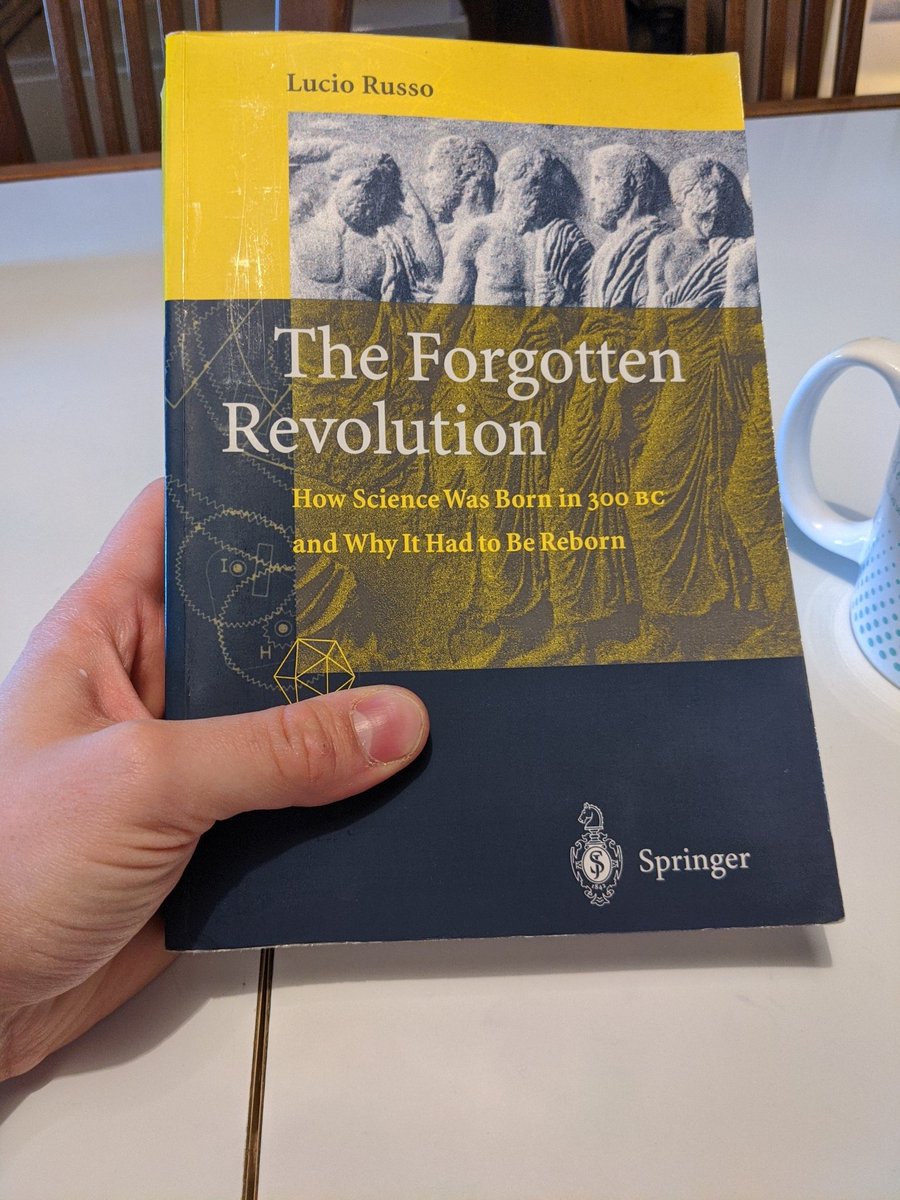
The Forgotten Revolution: How science was born in 300 BC and Why it Had To Be Reborn by Lucio Russo
It has proven a good companion for my morning coffee.
1/n
It has proven a good companion for my morning coffee.
1/n

Part of my thesis on Intellectual Dark Matter is that many of the momentus intellectual and ideological developments of the last three hundred years happened in previous civilizations as well.
2/n
2/n
"The naive idea that progress is a one-way flow automatically powered by scientific development could never have taken hold, as it did during the 1800s if the ancient defeat of science was not forgotten." p2
3/n
3/n
"Our culture... resorts to various expedients to hide from itself the historical importance of the birth of science" p6
4/n
4/n
"in face of a general regression in the level of civilization, it's never the best works that will be saved through an automatic process of natural selection"
p8
💯
5/n
p8
💯
5/n
Preservation of the most popular is apparent in:
1. We have popular science summaries from the Imperial Roman Era but not Greek originals (eg Pliny's Natural History)
2. For many scientific works we have just their introductions!
Intellectual dark matter indeed!
6/n
1. We have popular science summaries from the Imperial Roman Era but not Greek originals (eg Pliny's Natural History)
2. For many scientific works we have just their introductions!
Intellectual dark matter indeed!
6/n
Today we think of Ptolemaic Egypt with its capital Alexandria as the center of Greek learning in the period.
However the Seleucid Empire which controlled Mesopotamia and Syria might have been just as important!
A loss that we have so few archeological finds
7/n
However the Seleucid Empire which controlled Mesopotamia and Syria might have been just as important!
A loss that we have so few archeological finds
7/n
The Bactrian Kingdom might have been vital as well because of cross-fertilization and transmission of Greek and Indian thought.
en.wikipedia.org/wiki/Greco-Bud…
8/n
en.wikipedia.org/wiki/Greco-Bud…
8/n
"Eratosthenes carried out the first true measurement of the size of the earth"
Not usually noted is that the head of the Library of Alexandria was carrying out such work. Not librarian work! It was closer to a research institution.
9/n
Not usually noted is that the head of the Library of Alexandria was carrying out such work. Not librarian work! It was closer to a research institution.
9/n
Russo argues against history of science that frames past discoveries as the gradual collection of true facts sorted into categories.
Rather history of science must be written with a clear hypothesis of what science is in mind.
10/n
Rather history of science must be written with a clear hypothesis of what science is in mind.
10/n
Russo proposes these criteria to define what is and isn't science, for the purpose of historical work:
1. Statements are about specific theoretical entities
2. Theory has a deductive structure
3. Application to real world is based on correspondence rules
11/n
1. Statements are about specific theoretical entities
2. Theory has a deductive structure
3. Application to real world is based on correspondence rules
11/n
He also explicitly notes he isn't arguing for or against the validity of science thus defined (!)
12/n
12/n
Russo makes a distinction between scientific and non-scientific technology.
Proposes scientific technology is produced following a model that corresponds to reality to build new technology. Speeding up progress.
An analogy that comes to mind is escaping local maxima!
13/n
Proposes scientific technology is produced following a model that corresponds to reality to build new technology. Speeding up progress.
An analogy that comes to mind is escaping local maxima!
13/n
• • •
Missing some Tweet in this thread? You can try to
force a refresh


